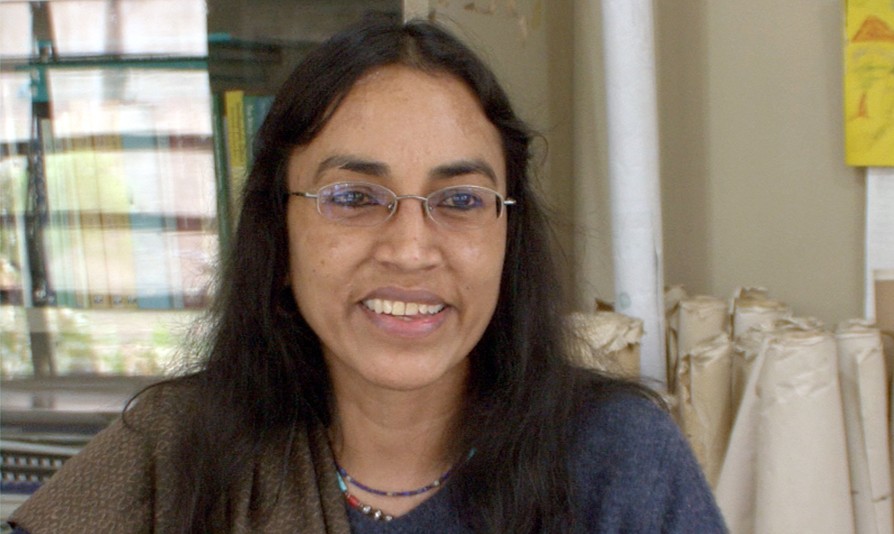
National College of Arts recently hosted a screening of Mahera Omar’s documentary, ‘The Rebel Optimist,’ an intimate portrait of architect and social activist Perween Rahman who was killed for her work in Orangi

People find it strange when I tell them of my rather silent adoration of college life in Lahore. Having never experienced it, it is unnaturally enticing to me. I moved back a little over a year ago and have since grown to envy my friends, their stories, and even their Whatsapp groups with their all-too-adolescent intrigues.
So, when I was asked to attend the screening of the documentary film The Rebel Optimist by Karachi-based filmmaker Mahera Omar at the National College of Arts (NCA), I jumped at the opportunity.
Sandwiched between the Town Hall and Lahore Museum is a far from quaint, red-brick campus, home to the eclectics of Pakistan. On a cooler evening than most I entered quite excitedly to find in the students a barrage of non-conformity. All were dressed differently, and a few, perhaps those with ascetic ambitions, even indifferently.
As I meandered my way towards the auditorium I stole a few quiet glances at the students seated beneath the many arches that line the corridors. What all I would have given to have been a fly on one of those spandrels, listening in, looking over as they sketched portraits and penned verses.
It was only when I looked at the statues of the human form that were scattered around the campus that I noticed their absence elsewhere in Pakistan. I saw for a second all the chowks and the chaurangis with tanks, missiles, horses, and swords that look over the bustling traffic of our cities, and saw in that second the absolute privation of the human form. Much afraid are we of idolatry, I suppose. I had to cut short such imperious digressions for the film was about to start.
As the lights dimmed, the film took my thoughts from the grand avenues over to the dirt lanes full of filth and choking gutters of Orangi.
Mahera Omar is a University of North Carolina graduate who has earlier produced a number of TV shows in Boston. One of her short films was screened at the 3rd International KaraFilm Festival also.
In The Rebel Optimist, Omar is able to paint an intimate portrait of Pakistani architect and social activist Perween Rahman who was killed by four masked men as she was on her way back home from the Orangi slum. The film combines an array of interviews of her loved ones with footage of Rahman herself. It makes an effort not to focus on Rahman’s death alone but rather her life, and includes testimonials from her family, her colleagues, and the people whose lives she had affected.
Born in Dhaka, Rahman and her family’s forced eviction from their home following the fall of East Pakistan left a profound imprint on her life. When she started work on the Orangi Pilot Project in the ‘80s she must have known first-hand of the plight of the residents of one of Asia’s largest slums, a collection of dispossessed migrants from India and Bangladesh. Tasked with aiding the efforts of locals to improve sanitation, Rahman over time helped transform the vast slum into an urban settlement.
By not only cleaning the streets but also mapping them she enfranchised a huge swathe of Karachi’s population by bringing them to the attention of government’s past and present. Who could have known that maps alone could have such power -- the power to enfranchise, but also the power to anger.
When surveying the water supply of Pakistan’s biggest metropolis, Rahman pin-pointed locations from where water was being stolen. This angered the various mafias of Karachi who were the beneficiaries of this theft and led to her assassination in March 2013, and the continued disruption of the Orangi Pilot Project.
The screening was followed by a discussion on the investigation of Perween Rahman’s death by her lawyer Kamran Sheikh. Mr I.A. Rahman, a stalwart in the field of human rights, also shared fond memories of the deceased.
As the evening turned to night and I stepped onto the Mall Road, I could not help but think of those statues that now hid behind the gates I had just exited. And as I crossed the road I thought that unlike our chowks that all too often celebrate human might, a statue is perhaps the celebration of human life. It is in this light that I see the effort of Mahera Omar. She is not just a filmmaker but also a sculptor in a sense, for she is able to construct for the audience an edifice celebrating the life of an extraordinary citizen.